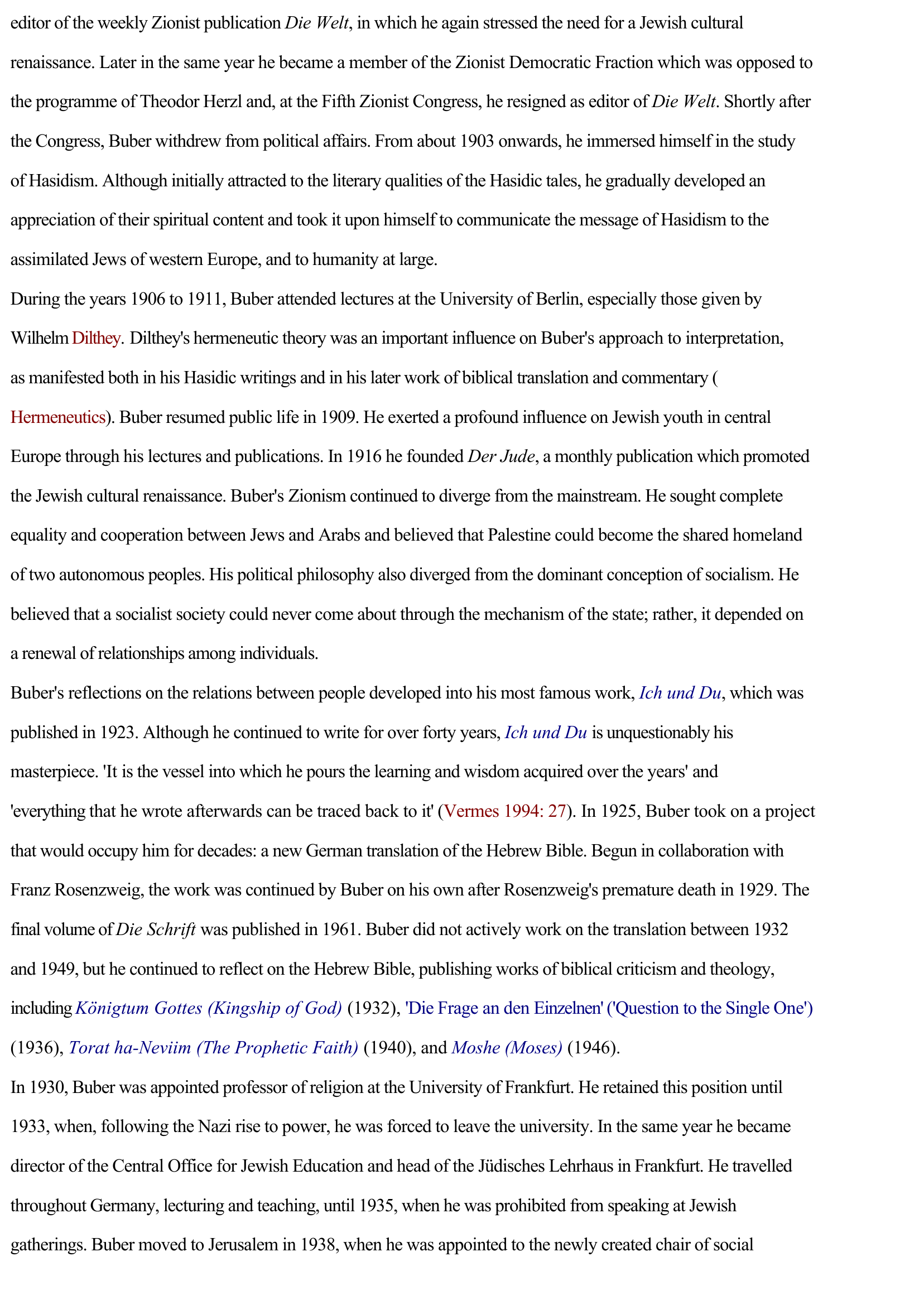Buber, Martin
Publié le 22/02/2012

Extrait du document
«
editor of the weekly Zionist publication Die Welt , in which he again stressed the need for a Jewish cultural
renaissance.
Later in the same year he became a member of the Zionist Democratic Fraction which was opposed to
the programme of Theodor Herzl and, at the Fifth Zionist Congress, he resigned as editor of Die Welt .
Shortly after
the Congress, Buber withdrew from political affairs.
From about 1903 onwards, he immersed himself in the study
of Hasidism.
Although initially attracted to the literary qualities of the Hasidic tales, he gradually developed an
appreciation of their spiritual content and took it upon himself to communicate the message of Hasidism to the
assimilated Jews of western Europe, and to humanity at large.
During the years 1906 to 1911, Buber attended lectures at the University of Berlin, especially those given by
Wilhelm Dilthey .
Dilthey's hermeneutic theory was an important influence on Buber's approach to interpretation,
as manifested both in his Hasidic writings and in his later work of biblical translation and commentary (
Hermeneutics ).
Buber resumed public life in 1909.
He exerted a profound influence on Jewish youth in central
Europe through his lectures and publications.
In 1916 he founded Der Jude , a monthly publication which promoted
the Jewish cultural renaissance.
Buber's Zionism continued to diverge from the mainstream.
He sought complete
equality and cooperation between Jews and Arabs and believed that Palestine could become the shared homeland
of two autonomous peoples.
His political philosophy also diverged from the dominant conception of socialism.
He
believed that a socialist society could never come about through the mechanism of the state; rather, it depended on
a renewal of relationships among individuals.
Buber's reflections on the relations between people developed into his most famous work, Ich und Du , which was
published in 1923.
Although he continued to write for over forty years, Ich und Du is unquestionably his
masterpiece.
'It is the vessel into which he pours the learning and wisdom acquired over the years' and
'everything that he wrote afterwards can be traced back to it' (Vermes 1994: 27 ).
In 1925, Buber took on a project
that would occupy him for decades: a new German translation of the Hebrew Bible.
Begun in collaboration with
Franz Rosenzweig, the work was continued by Buber on his own after Rosenzweig's premature death in 1929.
The
final volume of Die Schrift was published in 1961.
Buber did not actively work on the translation between 1932
and 1949, but he continued to reflect on the Hebrew Bible, publishing works of biblical criticism and theology,
including Königtum Gottes (Kingship of God) (1932), 'Die Frage an den Einzelnen' ('Question to the Single One' )
(1936), Torat ha-Neviim (The Prophetic Faith) (1940), and Moshe (Moses) (1946).
In 1930, Buber was appointed professor of religion at the University of Frankfurt.
He retained this position until
1933, when, following the Nazi rise to power, he was forced to leave the university.
In the same year he became
director of the Central Office for Jewish Education and head of the Jüdisches Lehrhaus in Frankfurt.
He travelled
throughout Germany, lecturing and teaching, until 1935, when he was prohibited from speaking at Jewish
gatherings.
Buber moved to Jerusalem in 1938, when he was appointed to the newly created chair of social.
»
↓↓↓ APERÇU DU DOCUMENT ↓↓↓
Liens utiles
- GOG ET MAGOG (résumé) Martin Buber
- JE ET LE TU (LE), 1923. Martin Buber - résumé de l'oeuvre
- RÉCITS HASSIDIQUES (Les) (résumé) Martin Buber
- Le Je et le Tu de Martin Buber (résumé et analyse)
- Buber Martin , 1878-1965, né à Vienne, philosophe israélien d'origine autrichienne.

































